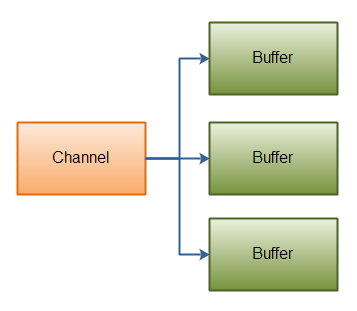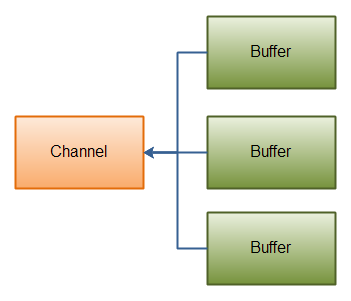分散(Scatter)/聚集(Gather)
(本部分原文地址,作者:Jakob Jenkov 译者:郭蕾)
Java NIO开始支持scatter/gather,scatter/gather用于描述从Channel(译者注:Channel在中文经常翻译为通道)中读取或者写入到Channel的操作。
分散(scatter)从Channel中读取是指在读操作时将读取的数据写入多个buffer中。因此,Channel将从Channel中读取的数据“分散(scatter)”到多个Buffer中。
聚集(gather)写入Channel是指在写操作时将多个buffer的数据写入同一个Channel,因此,Channel 将多个Buffer中的数据“聚集(gather)”后发送到Channel。
scatter / gather经常用于需要将传输的数据分开处理的场合,例如传输一个由消息头和消息体组成的消息,你可能会将消息体和消息头分散到不同的buffer中,这样你可以方便的处理消息头和消息体。
Scattering Reads
Scattering Reads是指数据从一个channel读取到多个buffer中。如下图描述:
ByteBuffer header = ByteBuffer.allocate(128);
ByteBuffer body = ByteBuffer.allocate(1024);
ByteBuffer[] bufferArray = { header, body };
channel.read(bufferArray);
注意buffer首先被插入到数组,然后再将数组作为channel.read() 的输入参数。read()方法按照buffer在数组中的顺序将从channel中读取的数据写入到buffer,当一个buffer被写满后,channel紧接着向另一个buffer中写。
Scattering Reads在移动下一个buffer前,必须填满当前的buffer,这也意味着它不适用于动态消息(译者注:消息大小不固定)。换句话说,如果存在消息头和消息体,消息头必须完成填充(例如 128byte),Scattering Reads才能正常工作。
Gathering Writes
Gathering Writes是指数据从多个buffer写入到同一个channel。如下图描述:
ByteBuffer header = ByteBuffer.allocate(128);
ByteBuffer body = ByteBuffer.allocate(1024);
//write data into buffers
ByteBuffer[] bufferArray = { header, body };
channel.write(bufferArray);
buffers数组是write()方法的入参,write()方法会按照buffer在数组中的顺序,将数据写入到channel,注意只有position和limit之间的数据才会被写入。因此,如果一个buffer的容量为128byte,但是仅仅包含58byte的数据,那么这58byte的数据将被写入到channel中。因此与Scattering Reads相反,Gathering Writes能较好的处理动态消息。
通道之间的数据传输
本部分原文地址,作者:Jakob Jenkov,译者:郭蕾,校对:周泰)
在Java NIO中,如果两个通道中有一个是FileChannel,那你可以直接将数据从一个channel(译者注:channel中文常译作通道)传输到另外一个channel。
transferFrom()
FileChannel的transferFrom()方法可以将数据从源通道传输到FileChannel中(译者注:这个方法在JDK文档中的解释为将字节从给定的可读取字节通道传输到此通道的文件中)。下面是一个简单的例子:
RandomAccessFile fromFile = new RandomAccessFile("fromFile.txt", "rw");
FileChannel fromChannel = fromFile.getChannel();
RandomAccessFile toFile = new RandomAccessFile("toFile.txt", "rw");
FileChannel toChannel = toFile.getChannel();
long position = 0;
long count = fromChannel.size();
toChannel.transferFrom(position, count, fromChannel);
方法的输入参数position表示从position处开始向目标文件写入数据,count表示最多传输的字节数。如果源通道的剩余空间小于 count 个字节,则所传输的字节数要小于请求的字节数。
此外要注意,在SoketChannel的实现中,SocketChannel只会传输此刻准备好的数据(可能不足count字节)。因此,SocketChannel可能不会将请求的所有数据(count个字节)全部传输到FileChannel中。
transferTo()
transferTo()方法将数据从FileChannel传输到其他的channel中。下面是一个简单的例子:
RandomAccessFile fromFile = new RandomAccessFile("fromFile.txt", "rw");
FileChannel fromChannel = fromFile.getChannel();
RandomAccessFile toFile = new RandomAccessFile("toFile.txt", "rw");
FileChannel toChannel = toFile.getChannel();
long position = 0;
long count = fromChannel.size();
fromChannel.transferTo(position, count, toChannel);
是不是发现这个例子和前面那个例子特别相似?除了调用方法的FileChannel对象不一样外,其他的都一样。
上面所说的关于SocketChannel的问题在transferTo()方法中同样存在。SocketChannel会一直传输数据直到目标buffer被填满。

